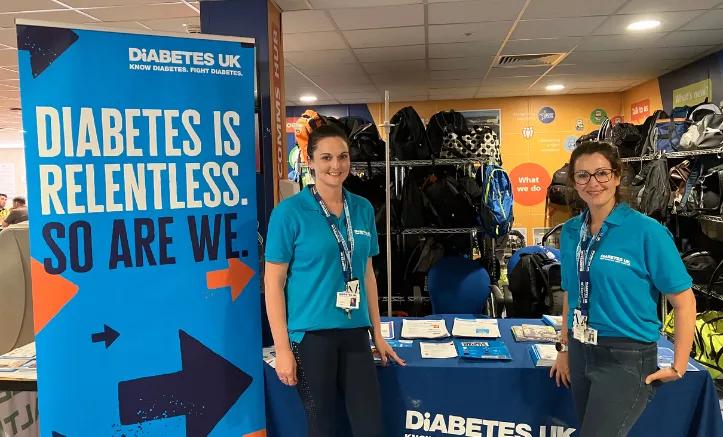
Earlier in June, the South West and South Central (SWSC) team were busy out and about talking all things diabetes, as part of Diabetes Week 2023. The week is a chance to raise awareness about the condition, educate people about how to lower their risk of type 2 diabetes and shine a light on the stories of people in our diabetes community who live day in, day out, with the condition. Here’s what we got up to.
Shining a light on diabetes tech
We know that diabetes technology can be lifechanging for people living with the condition, so to kick off the week, we sent out letters to all 10 of our Integrated Care Boards across the south west and south central.
The letter called for health systems to ensure local policies around access to diabetes tech aligns with the National Institute for Health and Care Excellence (NICE) guidelines.
We’ve had some great engagement from the systems that aren’t yet fully aligned, and we hope that by improving access to tech, more people living with diabetes will be able to better manage their diabetes.
Providing support to healthcare professionals
Phaedra, Head of SWSC, and Gary, our Health Systems Engagement Lead, were invited to attend the Bristol, North Somerset and South Gloucestershire’s Diabetes Conference.
Over 200 healthcare professionals attended, and Phaedra gave a talk about why Tech Can’t Wait and how we can support healthcare professionals with diabetes care.
Engaging with our diabetes community
We were delighted to be joined by 30 people living with diabetes, and some clinicians, for an online seminar about tech and who’s eligible for what.
Dr Rob Andrews, Associate Professor of Diabetes at the University of Exeter and Honorary Consultant Physician at Musgrove Park Hospital Taunton, gave a brilliant overview on this subject.
Anthony Walker from the Diabetes UK Policy, Campaigns and Mobilisation team then spoke about what you can get on the NHS, before two lovely members of our local diabetes community, Sue Briggs and Chris Wilkinson, spoke about their own experiences of using tech, before we took questions from attendees.
Chris also shared his story with local media. He spoke about the importance of tech when applying to regain his Pilot Medical.
The rest of the team were out and about engaging with Indian and Nepalese communities in Reading, speaking to attendees at the Bristol University Health Fair, and speaking about our peer support programme (Our Lives, Our Choices, Our Voices) at the South West Children and Young People’s Network.
Working in partnership with local organisations
We hosted another online webinar, this time for employees of Hinkley Point C nuclear power plant build which employs 10,000 people.
463 employees logged on for our diabetes awareness talk and Q&A session and the presentation was then sent out to all 10,000 members of staff – a new record for us in terms of mass reach.
We also spent two days onsite, which is home to 9,000 onsite staff, primarily men, with high numbers of Eastern European employees. Around 300 people had their risk assessed with countless more conversations had with those already diagnosed with type 1 diabetes, type 2 diabetes or wanting to find out about their risk.
Delivering bespoke support
It was delivery week for our National Lottery funded pilot project in Cornwall which aims to encourage conversations around healthy eating, build confidence in the kitchen and provide recipe inspiration to the individuals taking part. We had a great turn out, with 29 people from the local area attending the event.
Wrapping up the week
Phaedra closed the week with a great interview on BBC Radio Oxford, where she discussed diabetes and took part in some myth busting. You can listen back from 1.14 via the BBC website.
If you have any questions about our work in the local area, please contact us.
